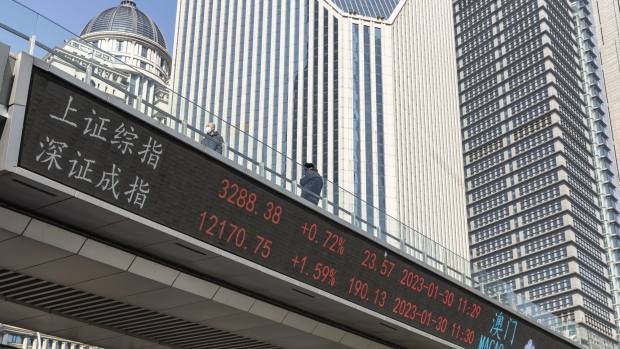Jul 9, 2023
A $28 Billion Wave of Selling Pressure Threatens China Stocks
, Bloomberg News

(Bloomberg) -- China’s equity market is facing a wave of selling as money locked up in stock funds matures, the latest pressure point that adds to a slew of concerns dragging on sentiment.
More than 200 billion yuan ($28 billion) of cash that’s been stuck in mutual funds over the past three years is about to be freed up, according to data compiled by Morningstar Inc. For frustrated investors contemplating cashing in, it’s a chance for them to find a new home for their money, away from equities.
One of the nation’s largest macro hedge funds, Shanghai Banxia Investment Management Center, warned in June that net outflows from three-year mutual and private funds will be “inevitable,” adding to downside risks. Those potential sales come as the market struggles with an economy that’s losing momentum and amid a dearth of new fundraisings.
“There should be a wave of redemptions following the expiry” given investors’ needs for liquidity after the lockups and the funds’ losses, said Yang Ruyi, a fund manager at Shanghai Prospect Investment Management Co.
In the latest move to boost sentiment, the securities regulator cut stock mutual funds’ management and custodian fees Saturday, and vowed to push more institutional investors to raise equity allocations through funds. The reductions could see the industry ceding more than 50 billion yuan, or 16% of revenue, to investors, according to China International Capital Corp. estimates.
Some 38 stock-related funds launched in 2020 with a three-year lockup averaged a 0.4% loss since inception as of May 31, with less than half of them posting a gain, the Morningstar data showed. The 13 funds set up in 2021 with a two-year lockup were all unprofitable, with an average loss of 13%. The 185 products with a one-year lockup expiring this year are down 3.3%.
The expiries also evoke memories from market swings last year, highlighting the fragility of sentiment. As China eased Covid curbs to revitalize the economy, the increase in risk appetite prompted rapid declines in corporate bonds, triggering investor redemptions in bond-focused wealth management products and funds. That in turn led to more selling, refueling what became a broad bond rout and forcing officials to prop up the market.
It’s a sea change from three years ago when money flowed into stock mutual funds in China. Then, star managers were smashing fundraising records as investors piled in money that drove a 27% surge for the year in the benchmark CSI 300 Index. Fund firms tapped the investor frenzy to raise 66 billion yuan with products that are locked up for three years. Chinese retail investors typically hold funds for a much shorter period, often less than six months.
‘Below Expectations’
Back then, fund houses touted the benefits of longer holding periods with confidence. Sticking with a fund for three years could mean a 77% chance of making a profit and a 29% average gain, Aegon-Industrial Fund Management Co. wrote at the end of 2020 to promote a new two-year product, citing a local index’s performance over the previous 10 years.
Investors who bought in are getting wary. Like Gardenia Ye, a 28-year-old education industry worker who purchased a few funds with lockups in the past few years, attracted by their presumed stabler returns and no need for frequent market tracking.
“The performance has been way below my expectations,” she said by phone.
On the internet, fellow investors in a Guangfa Fund Management Co. product were more explicit with their anger, as their investment in the three-year fund launched in August 2021 has since slumped by 43%.
“Not much time left for Liu Gesong — as soon as the lockup is lifted, it will be out of his control,” one investor wrote June 13, referring to its star manager on East Money Information Co.’s fund investment platform. “As massive money flows out, it will also be when Guangfa and Liu Gesong fall to the ground.”
Still, funds with lockup periods cannot guarantee returns and investors should have “reasonable expectations,” said Jingxia Dai, senior manager research analyst at Morningstar, pointing out that the three-year funds beat the benchmark CSI 300 Index on average.
Sell Quickly
Investor patience is certainly facing a big test. Almost 57% of China’s retail investors in funds with high stock positions typically hold for less than six months, with about 15% of them selling out within a week, according to a survey published by Yinhua Fund Management Co. last year. They also have a tendency to buy slowly but sell quickly, posing “a relatively big challenge” to fund managers who already face a “confidence crisis” with their investors, the survey found.
While there’s not enough public disclosure to estimate net redemptions and any impact on the market would be “limited” given such products’ small size, according to Morningstar’s Dai, outflows have already started at funds with lockups that expired earlier this year, including profitable ones.
A three-year fund by First Seafront Fund Management Co., which lost 6% as of June 29 since inception in March 2020, saw a 13% outflow in the first quarter this year. A fund of the same duration by Essence Fund Management Co., which gained 16% since inception in February 2020, had almost one third of its units redeemed in the three months ended March 31.
Investors are suffering from an “expectation gap” from the fact they still can’t make money after sacrificing a few years of liquidity, Howbuy Wealth Management Co. wrote in a report June 6. Managers should be prudent with lockups, which amount to “adding leverage to their reputation.”
For now, Ye, the education worker, said she’s more likely to hold on until the funds return to profit. “I probably won’t want to sell at a 30% loss, but I have little to expect from the market.”
(Updates with fee cut in fifth paragraph, investor comments in 12th)
©2023 Bloomberg L.P.






